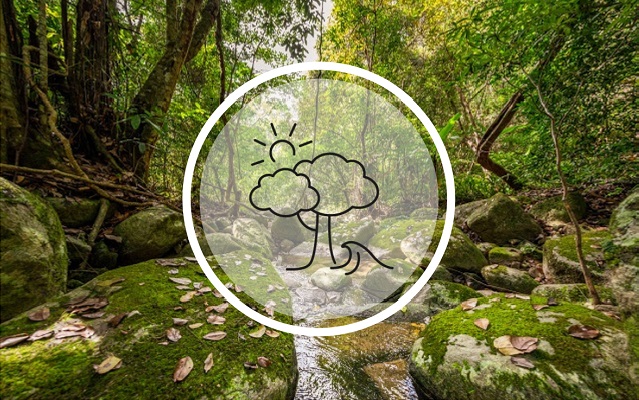Implementation of adaptation measures to climate change in the Karaganda oblast of Kazakhstan

In Karaganda oblast, drivers and impacts of climate change can be equally observable. While the oblast is the region’s industrial centre with huge emissions, residents face various climatic impacts such as floods and heat waves. In addition, there is a lack of climate information. The IKI Small Grants project aims to strengthen the resilience of Karaganda oblast to the impacts of climate change through a coordinated implementation of a local climate change adaptation plan. This plan is also presented at the national level to promote and upscale the development in Kazakhstan.
INITIAL SITUATION
The Karaganda oblast is located in the centre of Kazakhstan. 80 per cent of the total population of 1.38 million lives in the cities. On the territory of the oblast, drivers and impacts of climate change can be equally found. Rich in natural resources, the oblast is the industrial centre, contributing around 24 per cent of all emissions in Kazakhstan. 60 per cent of the oblast region lies in a semi-desert where winters get colder and summers hotter. The settlements are more covered with smog due to the decreasing wind and in spring there is flooding due to regular melting of snow. However, there is a lack of information on climate change. The Karaganda oblast still has no climate policy: a risks and vulnerability assessment has not yet been carried out, and adaptation measures are not even mentioned.
TARGET GROUP
The IKI Small Grants project targets up to 20 persons representing science, civil society, the private sector, and international cooperation. Approximately 20 experts, 50 NGO members and 20 reporters and bloggers benefit from the project through participating in the activities. Around 100 state officers benefit directly from the project activities as participants and another 1,000 indirectly as target audience of project informational materials. The entire population of the Karaganda oblast (1.38 million) benefits indirectly on the long-term perspective from the project, including at least 100,000 of the most vulnerable inhabitants (living in desert or flooded areas, farmers etc.).
APPROACH AND ACTIVITIES
The IKI Small Grants project aims to establish a climate action group to elaborate a participate climate change adaptation plan of the Karaganda oblast. For this, the organisation enters dialogue with the administration of the Karaganda to outline the need of establishing such a group. The climate action group is then further integrated into the government structure and the decision-making processes of the Karaganda oblast. Therefore, the group is meeting regularly to plan and implement activities on climate adaptation. The group’s members receive two trainings from international experts on climate risks to promote climate change adaptation.
The organisation elaborates a climate risk profile of the Karaganda oblast through exchanging with international experts and collecting and analysing information. The climate risk profile is then presented to governmental bodies and the public. It is published on the platform of Karaganda Regional Ecological Museum (EcoMuseum). Additionally, spreading in local mass-media and social media campaigns are organised.
The project further includes a training with 12 theoretical and practical sessions on climate change and adaptation measures for local decision-makers. The climate action group prepares guidelines for experts and local decision-makers to develop a climate change adaptation plan for Karaganda oblast. Other activities seek to approve and implement the climate change adaptation plan and present it in a workshop at national level to promote and upscale development mechanisms. The EcoMuseum is also organising a policy dialogue with the aim of incorporating the activities mentioned in the climate change adaptation plan into the development strategy of the oblast.
LATEST PROJECT HIGHLIGHTS AND IMPACTS
- The Climate Action Group meets on a regular, monthly basis, leading to the development of the Climate Change Adaptation Plan (CCAP), which has has been integrated into local policy documents
- Weekly distribution of material on climate issues and project activities via different social networks of EcoMuseum
- Presentation of project at the First Interregional Forum of Environmental Initiatives, speaking at the session on “Environmental Transparency for Problem Solving”, on availability of climate data and how the public can participate in developing climate policies
- Organization and participation of different workshops and events with various stakeholders. Topics included: how to get missing climate data for Kazachstan, risk assessment procedures for planning policies, the implementation of a roadmap to solve environmental problems of Karaganda region and how the public can actively do their part and be involved in solutions
- Climate change issues in the region were identified, and included in meetings of government agencies
- Climate measures in the Karaganda Oblast are integrated into national Environmental Action Plan
- Online course “Climate Change – It Affects Me” have been developed, aimed at enabling young people and the interested public to learn more about climate change in the region
CAPACITY DEVELOPMENT
IKI Small Grants supports Karaganda Regional Ecological Museum in their organisational capacity development through:
- Strategic planning with team building
ABOUT THE ORGANISATION
Karaganda Regional Ecological Museum was established in Karaganda in 1995 and registered with the Karaganda Department of the Ministry of Justice as a public association in 1997. Its mission is to investigate environmental problems in Kazakhstan, raise awareness of local communities, and increase the influence of the population on environmental issues. Therefore, democratic processes within the civil society need to be strengthened through the involvement of local communities in decision-making processes for improving the general environmental situation in the country.
